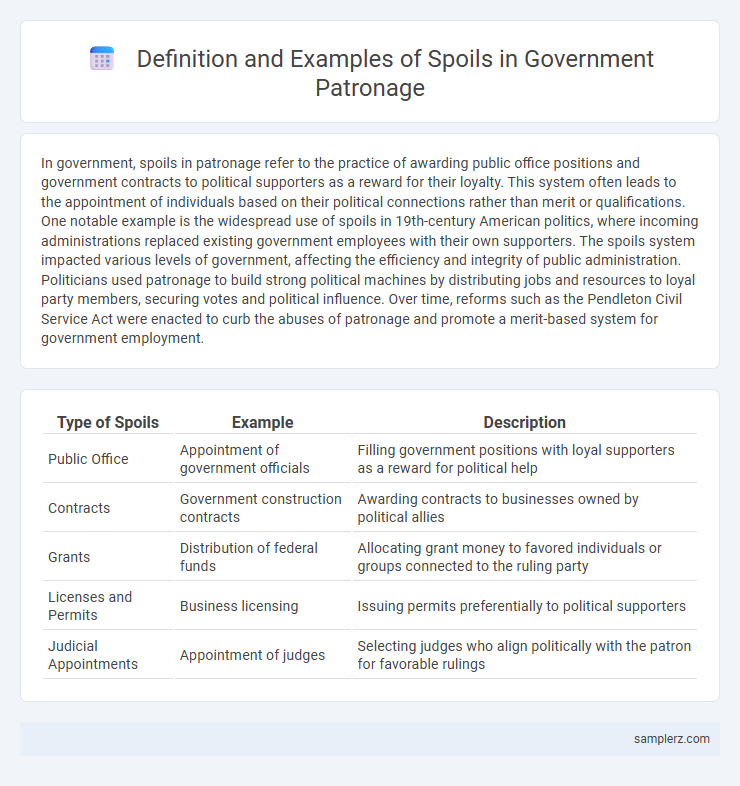In government, spoils in patronage refer to the practice of awarding public office positions and government contracts to political supporters as a reward for their loyalty. This system often leads to the appointment of individuals based on their political connections rather than merit or qualifications. One notable example is the widespread use of spoils in 19th-century American politics, where incoming administrations replaced existing government employees with their own supporters. The spoils system impacted various levels of government, affecting the efficiency and integrity of public administration. Politicians used patronage to build strong political machines by distributing jobs and resources to loyal party members, securing votes and political influence. Over time, reforms such as the Pendleton Civil Service Act were enacted to curb the abuses of patronage and promote a merit-based system for government employment.
Table of Comparison
| Type of Spoils | Example | Description |
|---|---|---|
| Public Office | Appointment of government officials | Filling government positions with loyal supporters as a reward for political help |
| Contracts | Government construction contracts | Awarding contracts to businesses owned by political allies |
| Grants | Distribution of federal funds | Allocating grant money to favored individuals or groups connected to the ruling party |
| Licenses and Permits | Business licensing | Issuing permits preferentially to political supporters |
| Judicial Appointments | Appointment of judges | Selecting judges who align politically with the patron for favorable rulings |
Understanding Patronage in Government
Patronage in government often involves appointing loyal supporters to key public offices as a reward for political backing, exemplified by the distribution of spoils such as government contracts, jobs, or resources. The spoils system, historically prominent in 19th-century American politics, allowed victorious parties to allocate federal positions to allies without regard to merit. This practice highlights the intersection of political loyalty and administrative control, influencing governance and public trust.
The Origins of the Spoils System
The spoils system originated during Andrew Jackson's presidency in the 1820s, where government jobs were awarded to political supporters as a reward for loyalty rather than merit. This practice entrenched patronage, as elected officials strategically distributed public offices to consolidate political power and ensure electoral success. The system often led to inefficiency and corruption, prompting future reforms like the Pendleton Civil Service Act to establish merit-based hiring.
Key Examples of Political Patronage
Political patronage frequently manifests through government appointments, where elected officials grant positions to loyal supporters rather than selecting candidates based on merit. Key examples include the appointment of judges, agency heads, and local government officials who align politically with the ruling party or individual. These spoils often consolidate power by rewarding campaign donors and party activists, influencing policy implementation and administrative decisions.
Impact of Spoils on Public Administration
Spoils in patronage systems often result in the appointment of unqualified individuals to public office, undermining the efficiency and professionalism of public administration. This practice fosters corruption and reduces accountability, as positions are awarded based on loyalty rather than merit. Consequently, governmental agencies experience decreased public trust and impaired service delivery, hindering effective policy implementation and governance.
Notable Historical Spoils Appointments
Notable historical spoils appointments include Andrew Jackson's selection of loyal supporters to key government positions following his 1828 presidential victory, exemplifying the spoils system in U.S. politics. Another significant example is the Grant administration's widespread patronage practices, which often led to corruption and inefficiency. These appointments underscore the politicization of civil service before reforms like the Pendleton Act established merit-based hiring.
Patronage and Corruption in Government
The spoils system in government patronage often results in the appointment of unqualified individuals to public offices as political rewards, compromising administrative efficiency. This practice fosters corruption by prioritizing loyalty and favoritism over merit, leading to misuse of public resources and erosion of public trust. Prominent examples include 19th-century U.S. political appointments where elected officials distributed government jobs to supporters, contributing to widespread graft and inefficiency.
Modern Manifestations of Political Spoils
Modern manifestations of political spoils often include awarding government contracts and appointments to loyal party members, bypassing merit-based evaluations. Examples such as the U.S. federal hiring practices during the Trump administration highlight the use of political loyalty as a criterion for staffing key positions. This form of patronage undermines public trust by prioritizing partisan allegiance over expertise and efficiency.
Legal Reforms Targeting the Spoils System
Legal reforms targeting the spoils system, such as the Pendleton Civil Service Reform Act of 1883, significantly reduced patronage by instituting merit-based hiring in government positions. The Hatch Act of 1939 further restricted political activities of federal employees, curbing the influence of spoils in public service. These reforms enhanced transparency and accountability within government institutions, limiting the arbitrary distribution of offices to political supporters.
Patronage Networks and Political Loyalty
Patronage networks exemplify spoils in government by distributing public resources and government jobs to loyal supporters, reinforcing political loyalty and control. These networks create a system where elected officials reward allies with positions and contracts, ensuring ongoing allegiance and consolidating power. Such practices often undermine meritocracy and entrench political machines reliant on reciprocal favors.
Comparative Analysis: Patronage Systems Worldwide
In the United States during the 19th century, the spoils system granted government jobs to political supporters, exemplified by Andrew Jackson's administration awarding thousands of federal positions to loyalists. In contrast, modern India's patronage system involves political parties distributing administrative posts and contracts to their affiliates, often as a means to consolidate regional power. Comparative analysis reveals that while patronage systems globally share the trait of favoritism, their impact varies significantly with institutional safeguards and transparency measures in place.

example of spoils in patronage Infographic
 samplerz.com
samplerz.com